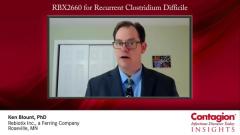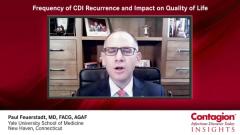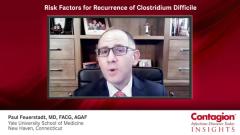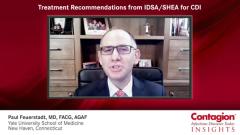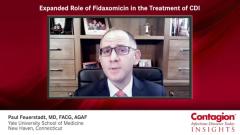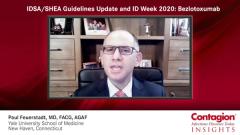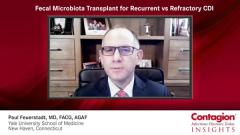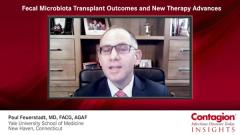
Managing Recurrent Clostridium Difficile Infections
Episodes in this series

Transcript:
Ken Blount, PhD: What the guidelines recommend for a first episode of C diff [Clostridioides difficile] is an antibiotic called vancomycin. That’s the most commonly prescribed antibiotic for the first episode. A newer antibiotic approved in 2011, known as fidaxomicin, is also indicated, particularly for the severe first infection. If neither of those are available, then metronidazole, an older C diff antibiotic, would be indicated per guidelines. Once a patient advances to that first recurrence, then the recommendation switches to an additional course of vancomycin, or what’s called a vancomycin taper, which is an interesting concept. It means that we’re going to go in there, treat the patient with vancomycin for several days, and then slowly decrease the vancomycin dosage over several days and space it out. The idea being that we know vancomycin can cause some harm to the microbiome, but if we kill the C diff and then we taper back vancomycin in a way that will keep C diff at bay while allowing some of the microbiome to grow back, then perhaps we can avoid recurrence.
Another antibiotic course that’s recommended for first recurrent C diff is fidaxomicin. It’s generally thought to be more microbiome sparing than vancomycin. That’s why it’s indicated in the first recurrent patients. Once patients have progressed past that first recurrence to multiple recurrent C diff, that means that they’re on their second or later recurrence, or they’ve had at least 3 episodes total, then the recommendation goes to strictly a vancomycin taper, or fidaxomicin, or a combination thereof.
The newer guidelines from 2017 also recommend consideration of what’s called a fecal microbiota transplant [FMT]. They do recognize that this is not an approved therapy, but they recognize that there are a lot of data in the literature to suggest it may work. A fecal transplant would be very much what it sounds like. A donor comes to the hospital, they provide a stool sample that’s homogenized into what’s called an FMT, and administered to the patient, usually by colonoscopy. This is done after antibiotic treatment. The idea being, can you add bacteria back into the patient that restores a microbiome that could resist C diff recurrence? It’s important to note that the guidelines recommend that at least 2 courses of antibiotic be considered, and they recognize that this is not yet an FDA-approved treatment.
Transcript Edited for Clarity
Newsletter
Stay ahead of emerging infectious disease threats with expert insights and breaking research. Subscribe now to get updates delivered straight to your inbox.


